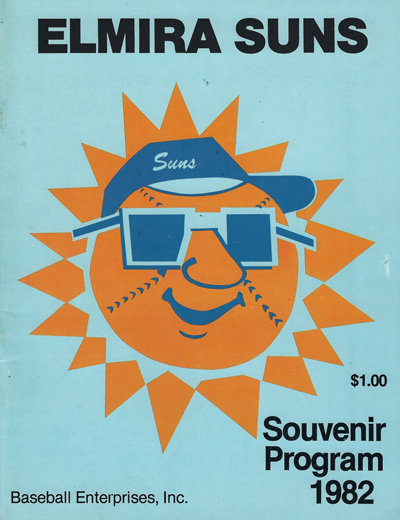New York-Penn League (1982-1983)
Tombstone
Born: 1982 – Re-branded from Elmira Pioneers
Re-Branded: 1984 (Elmira Pioneers)
First Game: June 18, 1982 (L 5-3 @ Oneonta Yankees)
Last Game: September 2, 1983 (W 6-5 @ Auburn Astros)
New York-Penn League Championships: None
Stadium
Dunn Field
Opened: 1939
Ownership & Affiliation
Owner: Lou Eliopulos
Major League Affiliation: Boston Red Sox
Attendance
Background
From the 1930’s to the present day, the many ball clubs that have made their home at Dunn Field in Elmira, New York have invariably been known as the ‘Pioneers’. No matter the league or the classification, to play ball in the Queen City is to be a Pioneer.
The name endured despite the efforts of various Major League sponsors to impose their own identities on the stubborn Elmirans over the years. The Philadelphia Phillies stitched “Phillies-Pioneers” onto the team uniforms at the start of the 1960’s. The Kansas City Royals outright renamed the team the Elmira Royals for one summer in 1971, but when the Cleveland Indians replaced them as Elmira’s parent club in 1972, the Pioneers name returned. A trio of Elmira owners during the 1970’s favored “Pioneer Red Sox” on the team’s souvenir programs and letterhead, but to fans every spring simply marked the return of their Pioneers to Dunn Field.1Mallette, Al. “Drop Pioneers Label? It’s Never Succeeded”. The Star-Gazette (Elmira, NY). December 22, 1981
The Sun Never Sets on Baseball Enterprises, Inc.
The biggest departure came during the summers of 1982 and 1983. In December 1981, Pioneers owners Alan Mintz and Marve Handler sold their New York-Penn League franchise to a man named Lou Eliopulos. Eliopulos was a World War II veteran who lived in Maryland and made his money operating a string of cemeteries in Florida. In 1978 he got into minor league baseball by purchasing the Jacksonville Suns of the Southern League for $100,000.
“I ran twelve cemeteries at one time, and I’d like to build the same kind of chain in baseball,” Eliopulos told Barry Siegel of The Los Angeles Times in 1981.2Siegel, Barry. “Rising of new Suns from the fallen Pines”. The Times (Los Angeles, CA). July 14, 1981
Eliopulos and his right hand man Bobby Bragan, Jr., proceeded to do just that. By 1982, their Baseball Enterprises, Inc. owned teams in five different minor leagues. In fact, just one day before Eliopulos added Elmira as the fifth ball club in his stable in December 1981, he had purchased the fourth: a Midwest League expansion club in Danville, Illinois.
Eliopulos wasn’t the first minor league owner to form a “chain” of teams and he wouldn’t be the last. What made him unique was his effort to develop a singular brand across all of his clubs. Enamored of the Suns name and logo he had inherited in Jacksonville in 1978, he franchised it across all of acquisitions and used the economies of scale to pump the consistent Suns merchandise into ballparks in Florida, Illinois, Maryland, South Carolina and New York. It was particularly unusual in an era where the prevailing style was for most minor league baseball teams (Pioneers notwithstanding) to adopt the identity of their Major League sponsor.
Red Sox Farm Club
As much as things changed off the field with the club’s marketing & presentation, the team’s on-field product remained remarkably consistent. Heading into the 1982 New York-Penn League season, the Suns retained their long-running affiliation with the Boston Red Sox first formed back in 1973.
Field manager Dick Berardino returned for his tenth season at the helm in Elmira. For a man to stay a decade in the same minor league job was (and remains) unheard of, but the New York-Penn League’s short June-August schedule uniquely suited the schedule and lifestyle of the school teacher from Waltham, Massachusetts.
The 1982 Elmira Suns finished last in their division, but featured a pair of top prospects in 18-year olds Mike Greenwell and Sam Horn.
In 1983, the final season of the Suns experiment in Elmira, 18-year old outfielder Ellis Burks made his pro debut at Dunn Field. Burks and Greenwell would go on team up in one of Major League Baseball’s most exciting young outfield with Boston in the late 1980’s. Sam Horn didn’t find quite the same level of success as Burks and Greenwell during his eight seasons in the Majors, but he remains a figure out cult adulation among middle-aged Red Sox fans, thanks his torrid 14-home performance as a late season call-up during his rookie season of 1987.
Pioneers Redux
By the time Lou Eliopulos achieved his dream of forming a chain of Suns-branded minor league baseball franchises, his health was already in decline. The 1982 season, with five clubs under the Baseball Enterprises banner, would prove to be the peak of his empire. As his health troubles continued, Eliopulos began to sell off his clubs.
In the case of Elmira, he sold the Suns to his lieutenant, Bobby Bragan Jr., in December 1983. Bragan immediately changed the name back to the Pioneers ahead of the 1984 season. Eliopulos would sell his original flagship club, the Jacksonville Suns, to another member of the Bragan family later in 1984. He passed away in 1987.
Dick Berardino returned to the re-established Pioneers in 1984 and ultimately stayed in Elmira for 13 seasons, before handing off the managerial reigns to his long-time coaching assistant Bill Limoncelli in 1986.
The Pioneers New York-Penn League franchise moved to Lowell, Massachusetts following the 1995 season. Independent (professional but non-Major League affiliated) and wooden bat league (amateur collegiate) revivals of the Pioneers have returned to Dunn Field in the years since.
Elmira Suns Shop
[auction-nudge tool=”listings”]
Downloads
1982 overview of Baseball Enterprises Inc., the ownership group behind the Suns.
Introducing Baseball Enterprises Inc.
Links
New York-Penn League Media Guides
##


One Response
any uniform numbers for the elmira suns players.